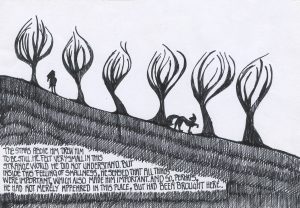
Poets & Painters
I’m just a man
Typing in a small crowded room
Describing the painting I saw once
Painted by a man
Who painted a picture based upon
Hearing the story of a man
Who once lived in a village in Sardinia
And fished for a living
In a hardy little boat
He never bothered to name,
Being too busy out there actually living
Among colors so very vivid—
Or so the painter insinuated
And I, sitting in this small crowded room,
Am telling you right now.
John Tustin
Review by Massimo Fantuzzi
This is an accomplished expression of how artistic inspiration spread from mouth to mouth, eye to eye, like a relay, like a food chain, like the rhythm of the traditional Passover cumulative song Chad Gadya.
Creativity moves from love of life and generosity; it’s amongst us, caught and passed, subject to contact, like a bad penny carried by many pockets, like an innate response, mostly asymptomatic. There’s no burden, no copyright infringement, no right of first refusal. It’s at the same time universal, and solitary, and of no propriety at all. It affects and involves all humans simultaneously. Yes, when you think of it, we all write in “a small crowded room.”
Review by Jared Pearce
I read this poem as a sort of inversion of Rilke’s “Archaic Torso of Apollo.” While the wonderful conclusion of Rilke’s poem, “You must change your life,” directly confronts the reader to consider what powers and plights and pleasures lie before us and how we’re engaging life, Tustin’s poem depicts the difference between doing, painting, and writing, allowing the writing, at the end, to also be a doing, but with a sort of unstated acknowledgement that even the writing (and the painting) for as wonderful as they are, rely on an engagement with the world to create something. In this way, the poem is an interesting reply to Plato, who at one point considered the poets three times removed from reality and, by being so far removed, were not so interesting, useful, or good. Tustin, however, tucks the second and third removals together—and maybe even brings us all together in the end, right now.
Review by Sophia Vesely
This is quite a powerful poem and touched me deeply immediately. Tustin, in his simplicity, defines perfectly the way art—the way, for us poets, words and writing—clutches so strongly to the notion of living, and of course loving, in a way that immortalizes and purposes the art. Tustin, in his small crowded room, proves that words (on paper or in oral stories) transcend, materialize as images, and live forever as art. And I am here now, commenting with words on Tustin’s poem, furthering the transcendence.
